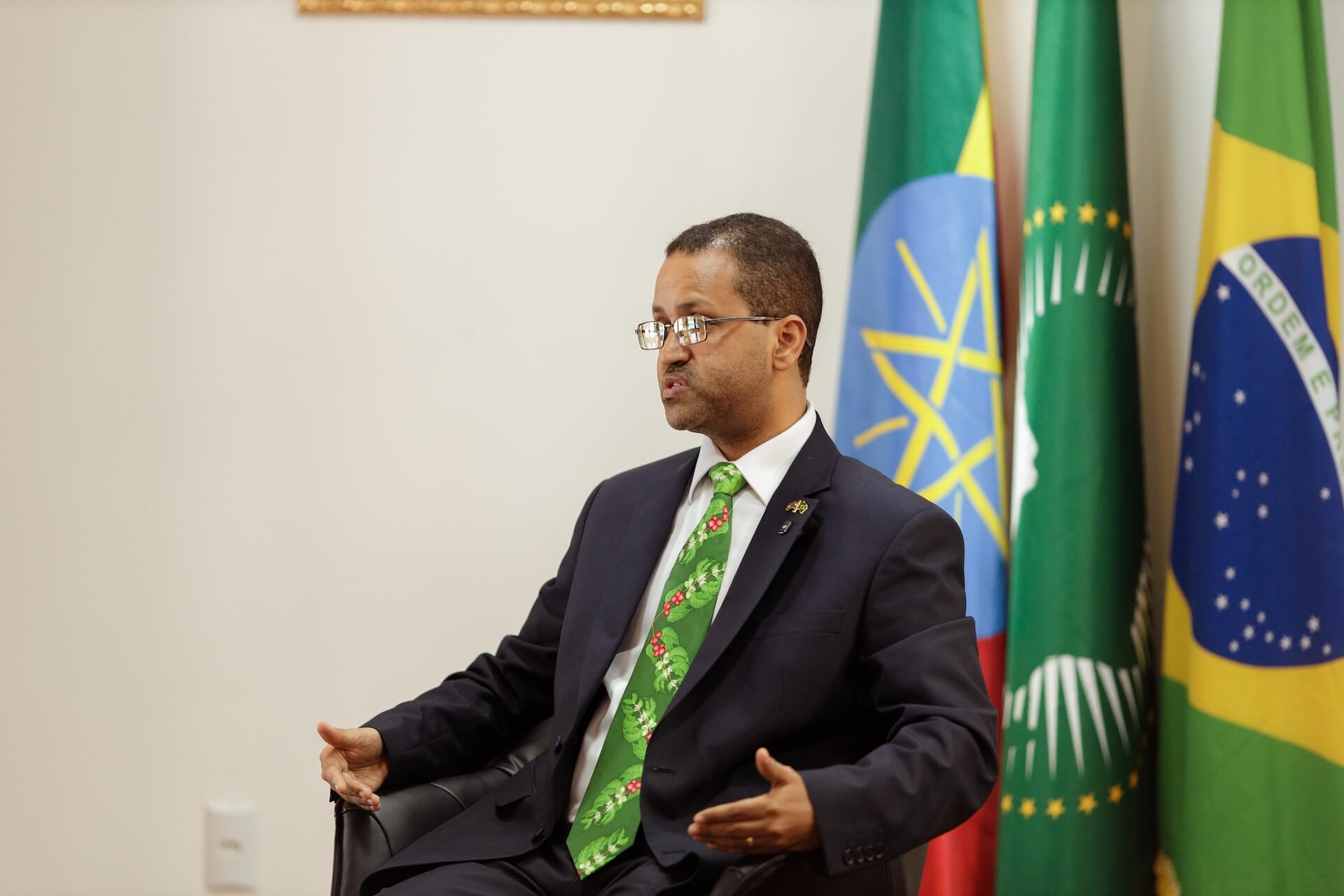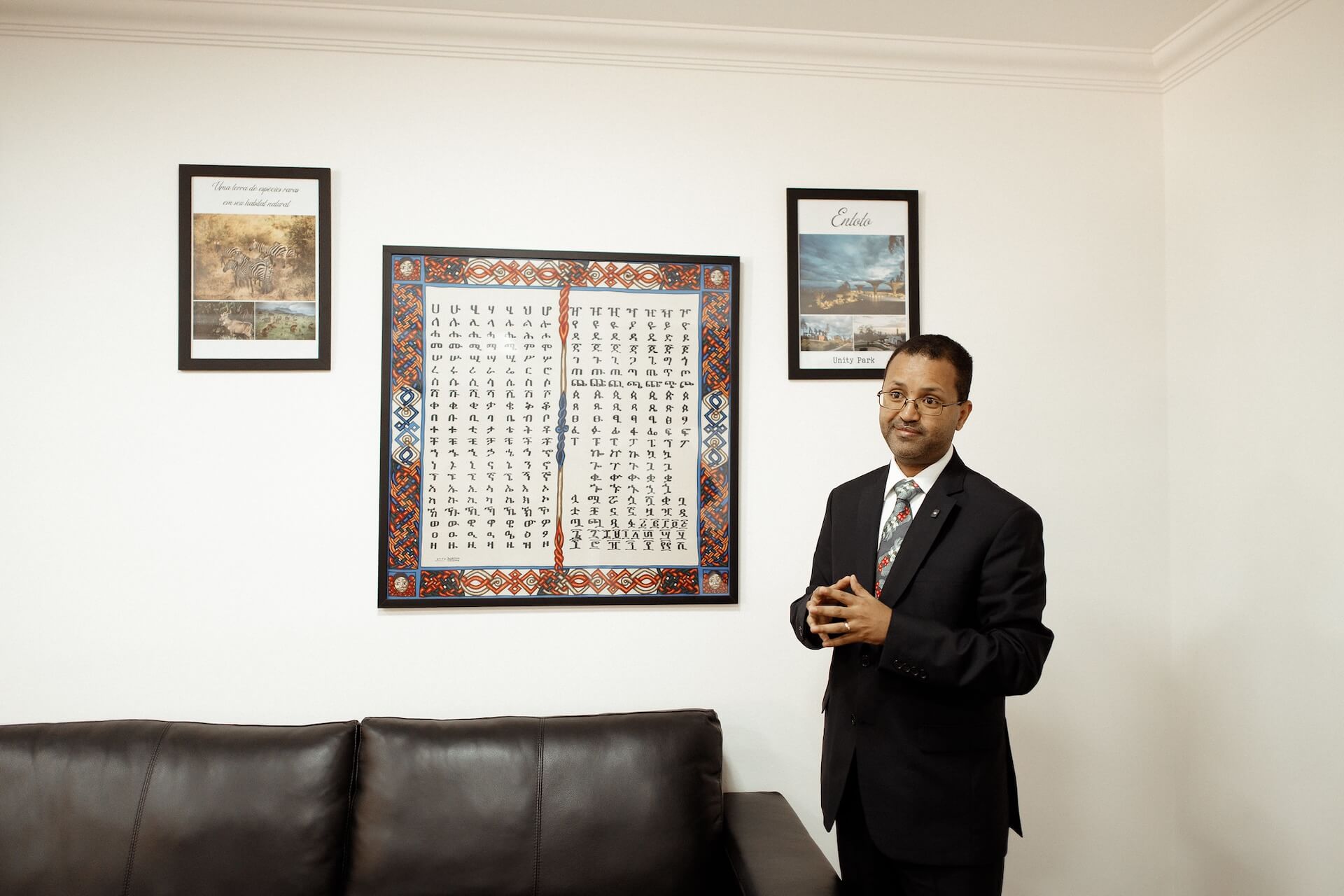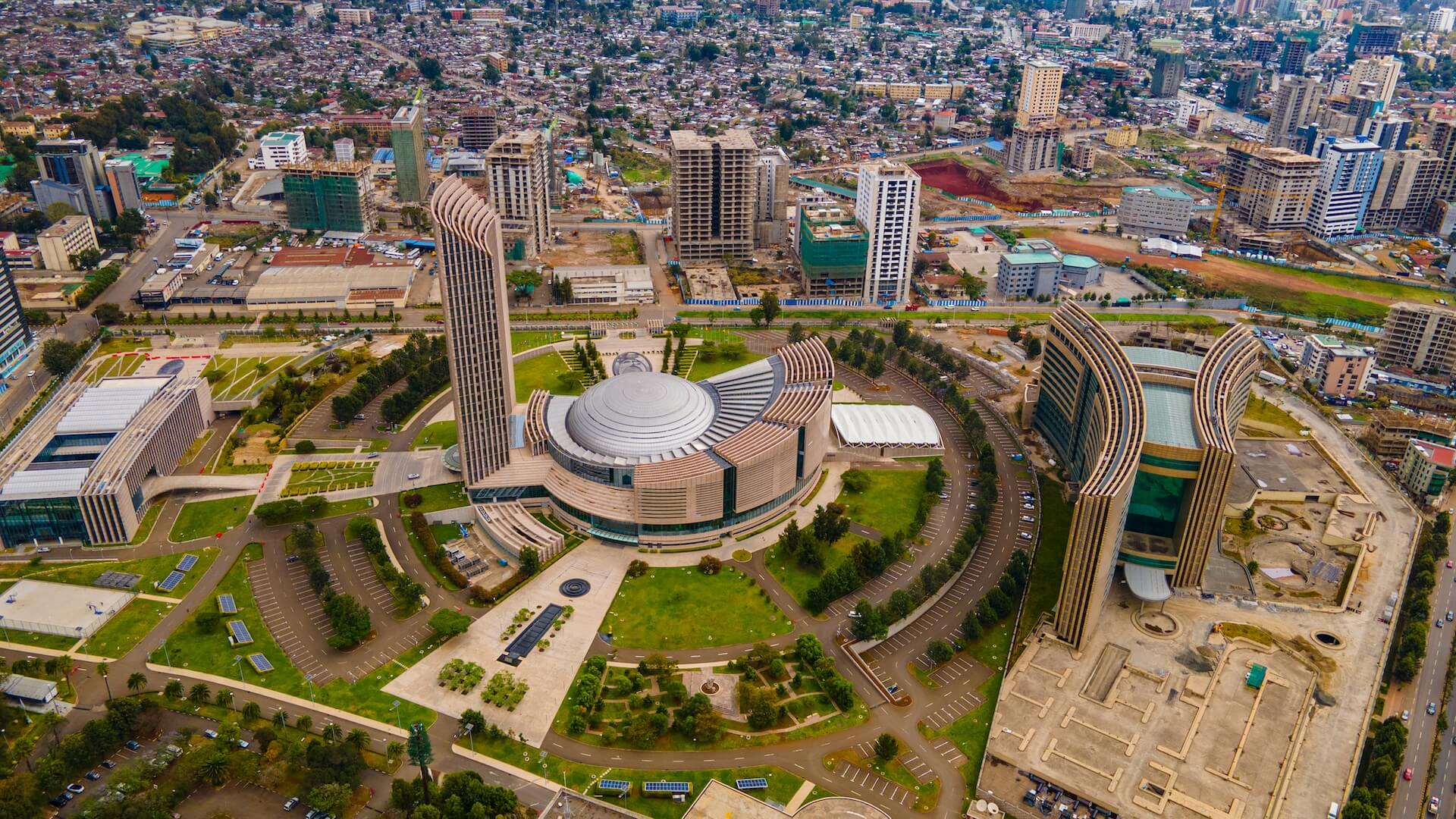“This is the moment to renovate and revitalize multilateralism”, the Ethiopian Ambassador stated
In an exclusive interview with the BRICS Brasil Communications Team, Ambassador Leulseged Tadese Abebe unfolds themes such as cooperation in agriculture and tourism among the group’s countries. Ethiopia, which joined BRICS last year, is the largest economy in East Africa and hosts the African Union in Addis Ababa.

By Franciéli Barcellos de Moraes | francieli.moraes@presidencia.gov.br
The land where coffee originated, the only African country with its own alphabet and —together with Liberia— the only two African nations not colonized by Europeans. These are some of the elements that tell the history of Ethiopia, where the African Union has its headquarters. Since 2023, it is also a member of the BRICS.
"If we want inclusive and sustainable development, this will not be attainable without the integral participation of women at every level and in all aspects."
With over 120 million inhabitants, the country is the second most populous in the African continent and the largest economy in East Africa. Ethiopia’s GDP grew tenfold between 2003 and 2017, rising from USD 8 billion to USD 80 billion, reaffirming its position as one of the world's fastest-growing economies.
Advancing cooperation in strategic sectors such as agriculture and tourism, strengthening policies to promote gender equality, highlighting the potential of the African Union, and recalling Emperor Haile Selassie’s historic statement, which uncompromisingly advocated for a multilateralism that responds to the demands of the Global South. These are some of the issues addressed by the Ethiopian Ambassador to Brazil, Leulseged Tadese Abebe, in an exclusive interview with BRICS Brasil. Check it out:
Agriculture, particularly family farming, is a key driver of income and employment in Ethiopia, accounting for the largest share of the country’s GDP and 80% of jobs. In this context, how relevant is it to discuss the specificities of this agricultural model within the BRICS agenda?
Leulseged Tadese Abebe: We have destined over 10% of the national budget to agriculture, and adopted an integrated rural development approach. This is because, when we talk about family farming, we are talking about rural development, which includes nutrition, health, schools, roads, and access to the market. Today, I can proudly say that we have become Africa’s largest exporter of wheat. This demonstrates the commitment of Ethiopia to the modernization of agriculture.
Within the BRICS framework, we can contribute to discussions while also learning from the best practices of other countries. The BRICS platform for agriculture presents an excellent opportunity for joint research and development. Furthermore, transforming agriculture requires private-sector engagement. We can attract companies from Brazil and other member countries to strengthen the agricultural sector. Through productive, results-oriented discussions, we can work toward the ultimate goal of transforming agriculture and ensuring food security.
Ethiopia is a country rich in history and culture and an abundance of natural beauty, with significant potential for expanding its tourism market. Since tourism is a key topic on the BRICS agenda, how does Ethiopia view the potential for cooperation in this sector?
Leulseged Tadese Abebe: Ethiopia is the land of origins, a nation of diversity and unity. We have 17 UNESCO-listed heritage sites, making us the first in Africa in terms of natural, historical, and religious landmarks. The landscapes, the welcoming population, the beauty, and the climate are truly the best – the climate is always agreeable and the people are very warm.
In this way, we welcome the BRICS discussions on the tourism sector. We can learn about each other's tourism opportunities, share best practices and promote tourism in the countries of the group. I believe that the ongoing discussion has been very productive, helping us to promote tourism as a source of economic growth and job creation, while always respecting national laws, local practices and, of course, the environment.
So we are very pleased with the ongoing discussions within BRICS, because one of the reasons we joined the group was to strengthen economic ties, and tourism is one of the best ways to strengthen these ties.

Data from 2023 show that women hold 41% of the seats in the Ethiopian Parliament, a rate that surpasses that of many countries in the Global North. How does Ethiopia promote women's participation in politics, and what message on gender equality does it aim to convey within BRICS?
Leulseged Tadese Abebe: For us, this is a central issue. If we want inclusive and sustainable development, this will not be attainable without the integral participation of women at every level and in all aspects. These factors are absolutely indispensable. First, because it is a matter of rights: women have the right to participate in every decision-making system, in every country, in every society. It is a right.
Secondly, from an economic standpoint, it is extremely useful for any country or society to take advantage of women’s potential because they play a decisive role in the prosperity of every society. It is the conviction that motivates Prime Minister Abiy Ahmed to ensure women’s participation in all levels of government.
However, we also understand that women’s participation must be significant not only in Parliament but in all spheres. The more women are empowered, the more conditions they will have to ensure their children’s education. If we want to ensure food security, including women —particularly in family agriculture— will have a much stronger impact. If we invest in women-led families, we will be more efficient on issues such as nutrition, for example. Women’s participation is the right decision from a political and economic standpoint.
"We are fully committed to integrating all the group’s mechanisms and arrangements. One of the most important pillars in the BRICS family is the New Development Bank."
For over six decades, Ethiopia has been successfully working in cooperation with the African Development Bank. Are there any projects underway or planned with the New Development Bank (NDB)?
Leulseged Tadese Abebe: We work with different development banks that are in line with our national priorities to promote real impact in the region, according to our reality and national context.
As for the New Development Bank (NBD), we have already asked to join. This is one of our priorities for this year since we already integrated the BRICS platform. We are fully committed to integrating all the group’s mechanisms and arrangements. One of the most important pillars in the BRICS family is the New Development Bank, and Ethiopia is ready to become a member.
We have already received political support from all BRICS members and hope to conclude our adherence process very soon. Once we are in, our focus will be on various sectors, including agriculture, energy, manufacturing, and others which are among the bank’s priorities.

In addition to Ethiopia, South Africa and Egypt also represent the African continent at BRICS. What is the main contribution that the countries of the African Union can make to strengthen the Global South?
Leulseged Tadese Abebe: Adis Ababa, the capital of Ethiopia, is the headquarters of the African Union, We contributed to the consolidation of the Union and, previously, to the establishment of the Organization of African Unity. So we have always defended Africa’s common stances. By adhering to the BRICS, Ethiopia —together with South Africa and Egypt— can promote the African positions on peace and security, inclusive and sustainable development, climate, and other issues.
"This is the moment to renovate and revitalize multilateralism — one that can answer to the legitimate claims and aspirations of the Global South. We must reform the global decision-making system to build a better future."
The African Union has common stances on various themes, including artificial intelligence —one of the priorities of the Brazilian BRICS presidency. So we can also speak with one voice to defend this agenda. Within the BRICS platform, we can promote Africa as a destination for trade, investments, and tourism. As you are aware, we are the world’s second-most populous continent, with 1.4 billion people — most of them youth. This is a great opportunity for global economic growth.
Eighty-nine years ago, Ethiopia’s then-Emperor, Haile Selassie, delivered a historic speech at the League of Nations Assembly, the predecessor of the United Nations (UN). How do you evaluate the significance of this speech today in the context of multilateralism?
Leulseged Tadese Abebe: Multilateralism has been weakened, and we need more multilateralism — because the world is highly interdependent. The issues we face in the fields of peace, security, development, and climate are universal and transnational. If the issues are universal and transnational, then solutions must also be universal and transnational.
The difference between what is "external" and "internal" has been fading because we live in a deeply interconnected world. And here is where the important message of Emperor Haile Selassie resonates the most. In 1936, after the invasion of Ethiopia by fascist Italy, he went to Geneva and spoke before the League of Nations, defending the importance of collective security and the indivisibility of peace. If one country is under illegal attack, this must be considered an attack against all peace-loving countries. However, the international community unfortunately failed to respond to Emperor Haile Selassie’s appeal at that time.
Ethiopia has always defended multilateralism, and Haile Selassie’s message in Geneva continues to be relevant for the world of today, which continues to face numerous transnational challenges. This is the moment to renovate and revitalize multilateralism — one that can answer to the legitimate claims and aspirations of the Global South. We must reform the global decision-making system to build a better future not only for the current generation but also for the generations to come.